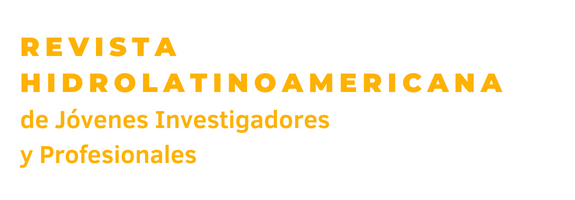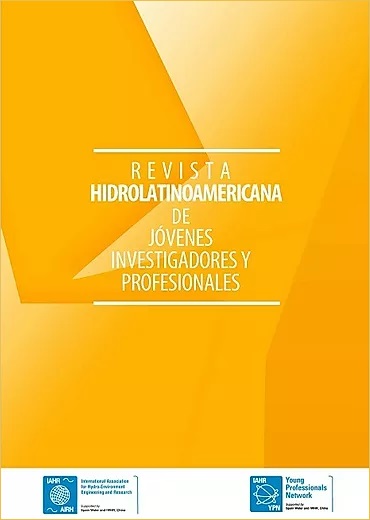Latin-American Water Journal of Young Researchers and Young Professionals
About Revista Hidrolatinoamericana
Our objectives:
Create a communication environment between YPN partners.
Increase youth visibility within IAHR.
Promote the participation of young people in international conferences and publications in magazines (RIBAGUA, JHR, JAWER, etc).
Our requirements:
You cannot submit more than 1 article per main author.
The original and unpublished contributions will be of a scientific-technical nature in one of the areas of the IAHR.
Contributions can be scientific, technical or present an innovative solution to an engineering problem.
The article's page limit is 3 pages in A4 format, according to the template provided (or alternatively see Resource Library of the Latin American Division).
The articles have to be sent to the presidents / vice presidents of the corresponding YPN's.
All contributions undergo an anonymous peer review process external to the publishing institution.
he review will indicate if the article can be valid for publication.
Templates:
Article submission
Recepción de artículos para el volumen 7 (2023) hasta el 30 de noviembre de 2023
Envío de resúmenes via Scienceconf
Guía de uso de Scienceconf
Code of ethics
Responsibility of the Editorial Board
Assist requests to analyze/review the status of the publication.
Evaluate the scientific rigor and the unprecedented nature of the proposed works.
Ensure compliance with the publication regulations of the Revista Hidrolatinoamericana de Jóvenes Investigadores y Profesionales.
Select anonymous peer reviewers taking into account their availability and specialty.
In general, papers proposed by members of the editorial board will not be accepted.
The editors will be responsible for the publication of errata correction and the retraction of articles, at the request of the main author.
Author's responsibility
It is the responsibility of the main author to present a scientific and rigorous description of his work, with an objective discussion of his results.
Authors must ensure the proper use of bibliographic sources. They must cite and give the appropriate attribution to those publications that have influenced the article to be published. The bibliographical references will be based on the APA Standards (sixth edition).
Data obtained privately, as a result of conversation, correspondence or discussion with third parties, will not be used in the manuscript without the explicit permission of the people through whom they were obtained. The information obtained from works under review or from collaborations will be treated in the same way.
The submitted document will not contain plagiarized material or falsify the research data. With their submission, the authors confirm that the article has not been previously published in any type of media, nor has it been simultaneously submitted to another journal.
Authors should not fragment their research paper for publication. Papers must give a complete description of the study aspect.
The articles that analyze the state of the question on a particular topic will be valid; however, articles of personal criticism will not be accepted.
To protect the integrity of the authorship of the work, only the people who have collaborated in the research/project and writing of the article will appear as co-authors. All authors must review and approve the final version of the paper. The main author certifies that they have included all the co-authors of the work when submitting their manuscript.
The author should not know the name of the anonymous reviewers or inquire about them.
The author is responsible for the express mention of the possible sources of financing to carry out his research.
By submitting their manuscript, the authors declare that there are no conflicts of interest in this article.
Editorial Comittee
EDITOR
Polytechnic University of Cartagena, Spain
ASSISTANT EDITOR
Julio Isaac Montenegro Gambini
Universidad Tecnológica de Delft, The Netherlands
ASSOSIATED EDITORS:
Colombia
Boris Jose Lora Ariza (Universidad Nacional de Colombia, Colombia)
Daniel Andres Cabrera Garzon (Universidad del Norte, Colombia)
Ecuador
Adriana Belen Correa Salazar (Universidad Católica de Santiago de Guayaquil, Ecuador)
Henry Fabrizzio Martínez Naranjo (Escuela Superior Politécnica De Chimborazo, Ecuador)
Patricio Ortega Lara (Escuela Politécnica Nacional, Ecuador)
España
Juan Naves García-Rendueles (Universidad de A Coruña, España)
Panamá
Maria Gabriela Castrellon (Universidad del Istmo, Panamá)
Perú
María de los Ángeles Amaya Toribio (Universidad Privada Antenor Orrego, Perú)
Cristhian Yober Arce Azabache (Universidad Nacional de Trujillo, Perú)
Carla Alexandra Bustinza Rodriguez (CEDIARHMA, Perú)
Michel Huber Cueva Portal (Universidad Nacional de Cajamarca, Perú)
Joshua Antonio Chilo Morón (Pontificia Universidad Católica del Perú, Perú)
Yoch Ponte Torres (Universidad Nacional Mayor de San Marcos, Perú)
Gerles Ediver Medina Orellano (Universidad Nacional de Ingeniería, Perú)
María Paz García Veramatus (Universidad de Ingeniería y Tecnología, Perú)
Portugal
Marta Sofia Ferreira Cabral (Instituto Superior Tecnico, Portugal)
Venezuela
Karol Sanchez (Universidad Central de Venezuela, Venezuela
Content Issue 2022
Content Issue 2021
Ecofeminismo y activismo hidrológico Ecofeminism and hydrological activism (García-Alén, G.; Lores, M.) HTML
Validación de simpleFoam mediante simulación de flujo laminar en un ducto rectangular Validation of simpleFoam by simulation of laminar flow in a rectangular duct (Castrellón, M. G.; Pulido Silva, G.) HTML
Análisis comparativo de sondas de detección de cambio de fase en un resalto hidráulico Comparative analysis between phase-change detection probes in a hydraulic jump (Ortega P.R.; Carrillo J.M..; Castillo L.G.; García J.T.) HTML
iDistrictos: Sectorización de modelos de redes hidráulicas de Epanet iDistricts. Sectorization of Epanet hydraulic network models (Vegas, O.; Martínez, F.; Tzatchkov, V.) HTML
Content Issue 2020
Content Issue 2019
Content Issue 2018
Content Issue 2017



